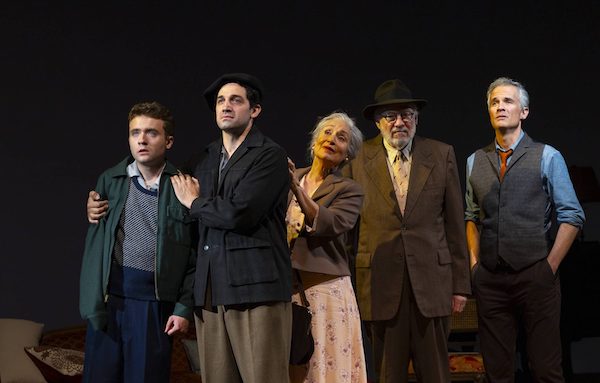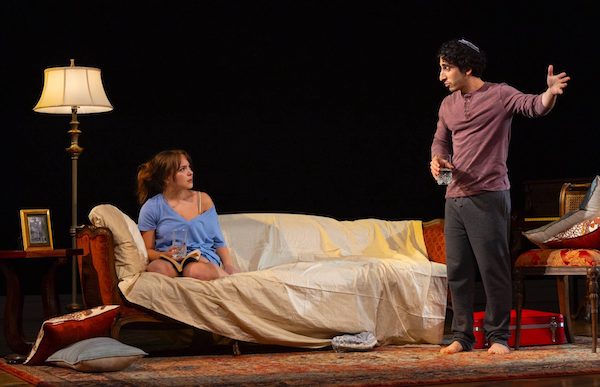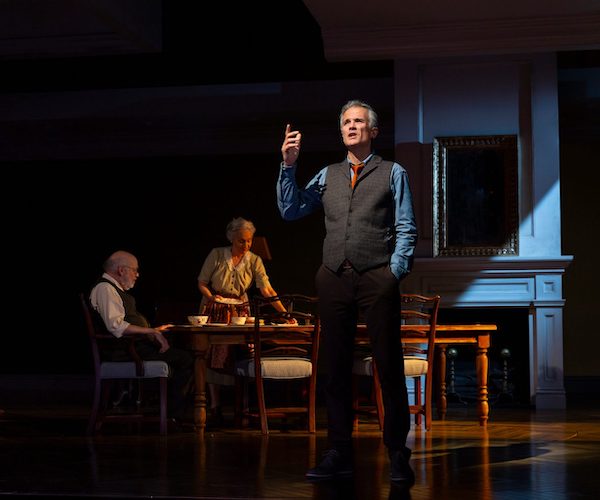Theater Review: “Prayer for the French Republic” — The Din of History
By Robert Israel
Prayer for the French Republic is of interest because it raises significant questions about faith during a hate-filled time.
Prayer for the French Republic, by Joshua Harmon. Directed by Loretta Greco. Staged by the Huntington Theatre Company, 264 Huntington Ave., Boston, through October 8.

The cast of the Huntington Theatre Company production of Prayer for the French Republic. Left to right: Jesse Kodama, Jared Troilo, Phyllis Kay, Peter Van Wagner, Tony Estrella. Photo: T Charles Erickson
As Jews prepare to celebrate the High Holy Days on September 15, Boston’s Huntington Theater Company has chosen to kick off its new year with Prayer for the French Republic. a drama about a multigenerational French Jewish family wrestling with identity, assimilation, and antisemitism. HTC’s newly appointed artistic director Loretta Greco — who also directs this production — draws on her previous staging of the work at the Magic Theatre in San Francisco. Greco lauds the play, by 40-year-old American playwright Joshua Harmon, calling it “a masterwork.”
Harmon is indeed a talented, ambitious playwright whose previous script, Bad Jews (Arts Fuse review), explored similar themes. He has a good ear for dialogue and a robust sense of humor. But he has not written a “masterwork.” The play is rife with flaws: chief among them is Harmon’s preference for creating characters (he wants them to “grapple with moral questions” he once told an interviewer) who sound like extensions of his research into Judaism, politics/history, and psychology. In other words, pompous mouthpieces. He shapes their speeches to elicit laughter, working the same vein plowed (and replowed) by Woody Allen, Neil Simon, Mel Brooks, Carl Reiner, et al. Another flaw: the play is overlong and badly in need of pruning — it runs three hours with one intermission. Many scenes cry out for the sharp scalpel of an editor: the production is peppered with protracted repartees.
The play is set in Paris during two time periods: 2016-17 and 1944-46. The 11-member cast takes us into both those (overlapping) eras, each weighty with history. Listening to five generations of family stories can be pretty exhausting. The glue that pieces this sprawling play together is the theme of antisemitism, specifically how the characters — then and now — respond to that scourge.

Left to right: Talia Sulla, Joshua Chessin-Yudin in the Huntington Theatre Company production of Prayer for the French Republic. Photo: T Charles Erickson
Harmon is not alone in calling our attention to antisemitism. A bumper crop of shows about Jews and Jew-hatred have dominated the theater this year. To wit: a Tony-award winning production of Tom Stoppard’s Leopoldstadt, (Arts Fuse review), about a multigenerational Austrian Jewish family wrestling with identity, assimilation, and antisemitism over a 50-year span (does the plot sound familiar?); a musical, Parade, about the trial and consequent lynching of American Jew Leo Frank, in Georgia, circa 1913; Alex Edleman’s one-man show Just For Us (this boychick from Newton, Massachusetts, also attempts to elicit laughter from lampooning Jew-hatred); and, set to open on Broadway in 2024 by way of London’s West End, a revival of Kander and Ebbs’ Cabaret restores a subplot excised from previous stage and film versions about a forbidden romance between a German landlady and her Jewish suitor in Berlin during the rise of the Third Reich.
Prayer for the French Republic‘s contribution to the trend is a pile-up of arguing that eventually reaches a fever pitch. Unfortunately, there are very few moments of real intimacy between the characters. When the sound and fury abate, when family members come together in a rare moment of solidarity — for example, lighting the Hanukkah menorah in the twilight of their Paris apartment — we feel there may be hope for them and for Judaism. Otherwise, we’re waiting for the next tumultuous outburst inspired by the maelstrom of Jew-hatred beyond their walls, the forced rat-a-tat-tat of dialogue designed to elicit chortles.

Left to right: (foreground) Tony Estrella; (background) Peter Van Wagner, Phyllis Kay in the Huntington Theatre Company production of Prayer for the French Republic. Photo: T Charles Erickson
I was impressed by the acting chops of the cast, particularly Amy Resnick, who brings stellar comic timing to the role of Marcelle Salomon Benhamou. Phyllis Kay — I first saw her perform in Newport a lifetime ago and knew then of her wondrous gifts — plays the put-upon Irma Salomon. She is eventually given a valuable cameo near the close of the play, a moment that provides us with one of the few quiet, intense intimations of introspection in an otherwise boisterous show. The scenic design by Andrew Boyce helps to move the action seamlessly between eras, but one scene — at a revolving dining table — had a dizzying effect.
Prayer for the French Republic is of interest because it raises significant questions about faith during a hate-filled time. To an extent, the script has the potential to become a “masterwork.” But, in order to reach that high bar, the hype-speak has to be ditched to make way for a clear-eyed examination of the play’s strengths and weaknesses. Harmon — and director Greco — need to pare down the deafening din if they are going to probe the sensitivities of the script’s characters more deeply.
Robert Israel, an Arts Fuse contributor since 2013, can be reached at risrael_97@yahoo.com.
Tagged: Huntington-Theatre-Company, Joshua Harmon, Loretta Greco

The major difference between Leopoldstadt, Parade, and Cabaret (I have not seen Just for Us) is that French Republic speaks about antisemitism today, now. Yes, it chronicles a 50-year history but the couple in Paris are afraid for their health and lives right now.There are no period costumes, sets that can lull us into thinking — well, that was then. The turn of the 20th century, the time in Berlin between the wars. French Prayer is much more urgent and therefore, upsetting.
Just so. Saw Prayer tonight, and it was engaging — not a TOTAL hot mess — but this review points out its flaws well. The brilliant Nael Nacer stepped in this evening as U/S Charles and was, as usual, thought-provoking in the role.